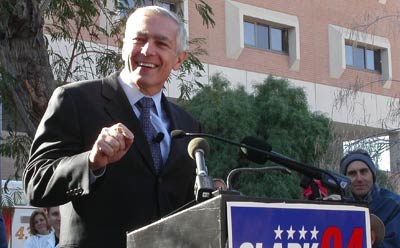Democratic presidential candidates and space: a primer<< page 1: Dean: on to Mars… maybe Clark’s 20-year visionRetired US Army general Wesley Clark is a relative latecomer to the campaign: he did not officially declare until the early fall, long after the other candidates had started their campaigns. Clark, though, after a rough start has emerged as one of the frontrunners, running close behind Dean in a nationwide poll last week and gaining ground against Dean in New Hampshire. Clark also has no political experience on a national or even local level, so his viewpoints on many issues are not clear. Clark shed a little light on his opinions during an address in New Hampshire on Saturday where he laid out his “20-year vision” for America. In that speech he said he was inspired as a youth by science fiction books that included “space flight that was an everyday occurrence, and journeys to far-away planets.” Clark then offered where space fit into his vision: We’ll move beyond the Space Shuttle and a few unmanned missions within the Solar System with more substantial efforts to help humanity explore the frontiers of space. We’ll do it with real programs designed to most efficiently and effectively generate the science skills and technology we need to meet what I believe will be our destiny. Clark then hinted that those plans could include human missions to Mars: Imagine if in the next twenty years, we actually sent humans - not just rover robots—to Mars—which we can do if it truly advances our ambitions. Astrobiologists today believe we will, and as a result, we’ll have a better understanding of our own planet and our own people.
Clark hasn’t offered any specific proposals or price tags, and has remained quiet to date on Bush’s rumored new policy. A few pro-space Clark supporters have created their own weblog where they are discussing what role Clark should play in space policy issues, but it’s not clear what influence, if any, they have on the campaign. Kerry’s bland supportJohn Kerry, a US senator from Massachusetts, was once considered a frontrunner for the Democratic nomination. However, his star has faded in the last several months, primarily at the expense of Dean. Kerry is now running well behind Dean and some other candidates in both Iowa and New Hampshire, and could be forced to pull out if he does poorly in those two early races. Kerry’s campaign did respond to our email query last week, the only campaign to do so. However, rather than answer the questions, the campaign provided a copy of a statement that Kerry entered into the Congressional Record shortly after the Columbia accident last year. In the statement Kerry states his support for the shuttle program and space exploration in general, but provides no specifics: We must continue the exploration of space. I have always supported the space program because I believe it is in the best interests of mankind to unlock the mysteries of life on earth and beyond. The shuttle missions have helped us understand global warming, weather patterns, and the effects of weightlessness on the human body, aided in the understanding of disease, and exponentially increased our understanding of the universe. It would be impossible to quantify the knowledge we have gained from sending men and women into space. Space flight brings out the best in us. It challenges us to think big, to strive for greatness, and to work together to achieve the most important goals. There is no doubt in my mind that we should continue these missions and prepare the next generation of astronauts for the challenges that lay ahead. Gephardt’s caution
Congressman Dick Gephardt of Missouri, a former House minority leader, was among the first Democratic candidates to comment on the new space policy the president is expected to announce this week. Speaking Friday in New Hampshire, Gephardt said that he was supportive of space exploration in general, but had other projects, notably alternative energy research, he would rather spend large sums of money on. “I have nothing against NASA programs. I’ve been a supporter of them because I think you need that vision out there, especially for young people,” Reuters quoted him as saying. “But you can’t shortchange the research that we need for things that need to happen here on Earth. That’s why energy research is so vital.” Gephardt expanded on those comments on the CBS program Face the Nation Sunday morning, wondering if it was a wise idea to pursue a new space initiative while the International Space Station remains incomplete: I think that before we make that decision, we’ve really got to decide what we’re doing with the present space program, which is revolving around the space station. I think we need to do a—a real analysis by our scientific community on what the best thing is to do. I don’t think—I haven’t looked at the numbers lately, but I don’t know that we can go off on a new moon mission or Mars mission, if that's the suggestion, and—and just have the money to do something in addition to completing the space station. I think we’re pretty far down the road on the space station and we need to complete it and have the success from it that we need. One of the good aspects of the space station is that we get to work with the Russians, and we give them an important role, and other countries in the world. I think that’s very important. And maybe down the road we can look into—into other projects. |
|
